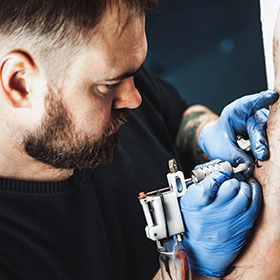Yes, numbing cream can affect tattoos. It might impact the tattoo process and the final result.
Many people wonder if using numbing cream during a tattoo session is a good idea. While it can make the process less painful, it’s important to know the potential effects. Numbing creams can alter the skin’s texture, making it harder for the artist to work.
This could result in a less precise tattoo. Some creams might also affect how the ink settles into the skin. Understanding these impacts can help you make an informed decision. This blog will explore how numbing creams interact with tattoos, helping you weigh the pros and cons.
What Is Numbing Cream?
Numbing cream is a topical ointment. It helps reduce pain. People use it before getting a tattoo. The cream numbs the skin. This makes the tattoo process less painful. Numbing creams are popular among people with low pain tolerance. They also help during long tattoo sessions. The cream is easy to apply. You just spread it on the skin. Wait for it to take effect. Then, you can start your tattoo.
There are three main types of numbing creams. Lidocaine-based creams are the most common. They numb the skin effectively. Tetracaine-based creams are another option. They provide deeper numbing. Benzocaine-based creams are also used. They work well for shorter tattoo sessions. Each type has its own benefits. Choose the one that suits your needs best.
Numbing creams block pain signals. They stop the nerves from sending pain messages. This makes the skin feel numb. The effect lasts for a few hours. Enough time to complete a tattoo. The cream should be applied 30-60 minutes before the tattoo. Cover the area with plastic wrap. This helps the cream work better. Remove the wrap before the tattoo starts. The skin will be numb and ready.
Tattoo Process And Pain
Getting a tattoo involves several stages. First, the artist will clean the skin. Then, a stencil of the design is applied. Next, the tattoo artist uses a needle to inject ink into the skin. This part can be painful. The final stage is cleaning and covering the tattoo.
Pain levels vary during tattooing. Some areas hurt more than others. For example, areas with more bone or less fat are more painful. Everyone feels pain differently. Some find the pain bearable. Others may find it very uncomfortable. Numbing cream can help reduce this pain.
Numbing Cream In Tattooing
Numbing cream helps reduce pain during tattooing. It doesn’t affect the tattoo’s appearance or quality. Always follow the artist’s advice for best results.
Application Before Tattooing
Numbing cream helps reduce pain during tattooing. It should be applied 30-60 minutes before starting. Clean the skin first. Apply a thick layer of the cream. Cover it with plastic wrap. This helps the cream to work better. Remove the wrap just before tattooing.
Common Brands Used
| Brand Name | Main Ingredient |
|---|---|
| Dr. Numb | Lidocaine |
| Hush | Lidocaine |
| TKTX | Lidocaine |
| Ebanel | Lidocaine |
These brands are popular. They are trusted by many tattoo artists. Check with your artist before using any cream. Some artists prefer specific brands.
Benefits Of Numbing Cream
Numbing cream can greatly reduce the pain during tattooing. It helps make the experience more bearable. Many people find tattoos painful. This cream can ease that pain. It is especially helpful for those with low pain tolerance. It allows them to sit through the process comfortably.
Long tattoo sessions can be very uncomfortable. Numbing cream provides comfort during these long periods. It keeps the skin numb for a longer time. This allows the artist to work without many breaks. The client can sit still easily. This makes the session go smoothly. Everyone is happier with the result.
Potential Downsides
Numbing cream can sometimes affect the tattooing process. It may cause temporary changes in skin texture. This can lead to potential challenges for the tattoo artist.
Allergic Reactions
Numbing cream can cause allergic reactions. Some people have sensitive skin. They might experience redness, itching, or even swelling. It is important to test the cream first. Apply a small amount to the skin. Wait for a few hours. If there is no reaction, it might be safe to use. Always check the ingredients. Some chemicals can be harsh. Consult a doctor if unsure.
Impact On Tattoo Quality
Numbing cream might affect the tattoo. It can change how the skin feels. This can make it harder for the artist. The tattoo might not look as sharp. Sometimes, the ink does not settle well. This can cause fading or blurring. Always talk to your tattoo artist. They can give the best advice. Using numbing cream is a personal choice. Weigh the pros and cons carefully.
Tattoo Artists’ Opinions
Many tattoo artists have mixed feelings about numbing cream. Some believe it can help clients who fear pain. Comfort during the tattoo process can be important. Other artists worry it might affect the quality of the tattoo. They say it might change how the skin reacts to the needle. This can make their job harder. They recommend talking to your tattoo artist first.
People have different reactions to numbing cream. Some feel it makes the experience much easier. They are able to sit for longer periods. Others say it did not work well for them. They still felt pain. Results can vary from person to person. Trying it on a small area first might help. This way, you can see how your skin reacts. Always follow the instructions on the product.
Scientific Research
Some studies show that numbing cream can help with tattoo pain. People feel less pain. This makes the tattoo session easier. But not all people have the same results. Some do not feel much difference. It’s important to try a small amount first. See how it works for you.
Numbing cream may not cause long-term harm. But some people might have skin reactions. It can cause redness or itching. It’s best to test the cream on a small area. Watch for any bad reactions. Always follow the instructions on the package. Talk to a professional if unsure.
Alternatives To Numbing Cream
Numbing cream can sometimes affect the tattoo process. Pain relief alternatives include deep breathing, distraction techniques, and over-the-counter pain relievers. Always consult your tattoo artist before using any product.
Pain Management Techniques
Some people use deep breathing to manage tattoo pain. Slow, deep breaths can calm the body. Music also helps. Listening to favorite songs distracts from the pain. Another method is to stay hydrated. Drinking water keeps the skin healthy. Healthy skin can handle pain better. Stretching before the tattoo session can relax muscles. Relaxed muscles make the process easier. Lastly, a good night’s sleep is important. Rested bodies deal with pain more effectively.
Natural Remedies
Natural remedies can reduce tattoo pain. Aloe vera gel soothes the skin. It can be applied before and after the session. Coconut oil is another option. It moisturizes and protects the skin. Essential oils like lavender can also help. They have calming properties. Ice packs are useful too. Apply for short periods to numb the area. Finally, chamomile tea is soothing. Drinking it calms nerves and reduces stress.
Conclusion
Numbing cream can ease tattoo pain. It doesn’t affect the tattoo quality. Always discuss with your tattoo artist first. They can guide you on its use. Proper usage ensures a comfortable experience. Remember, each skin reacts differently. Keep your skin healthy and follow aftercare instructions.
This helps maintain the tattoo’s appearance. Happy tattooing!

